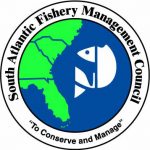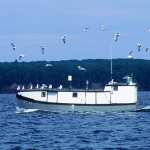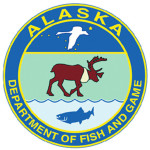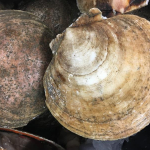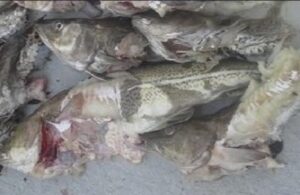Tag Archives: Jeffrey Hutchings
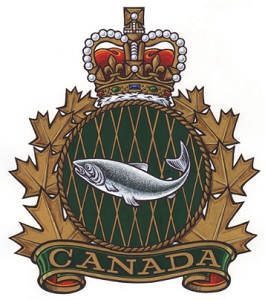
Scientists Level New Critiques of Fisheries and Oceans Canada’s Scientific Rigor
Twenty-five years ago, after the collapse of the Atlantic cod fishery, Jeffrey Hutchings, a preeminent fisheries scientist and professor at Dalhousie University in Nova Scotia, sounded the alarm that Canada’s federal fisheries department was allowing “nonscience influences” in critical decision-making. Writing at the time, he said, “There is a clear and immediate need for Canadians to examine very seriously the role of bureaucrats and politicians in the management of Canada’s natural resources.” Today, a new crop of researchers is once again imploring Fisheries and Oceans Canada (DFO) to change its ways. At the core of their concerns is a number of systemic and structural ways in which DFO gathers, parses, and handles scientific information, and how that advice is passed on to decision-makers. >click to read< 09:20

The cod delusion – A moratorium on cod fishing that was supposed to last two years has now lasted 30.
Three decades on, the latest DFO science still puts Atlantic cod in the critical zone. “I hope politicians and bureaucrats in Ottawa have learned something, because I’ve learned something: the moratorium was the biggest catastrophe ever heaped on the people in this province, ever. Nothing has been as bad as this,” says Captain Saunders, an 80-year-old Inuk. Seated in the wheelhouse of his longliner, docked in Pinsent’s Arm in late September 2021, Saunders speaks with the authority of someone with six decades of fishing experience, backed by centuries of hindsight. “Newfoundland and Labrador people fished for 500 years and didn’t damage the stocks. What Canada done was an atrocity in my opinion. It ruined a way of life. It ruined culture. All the stages, stage heads, they’re all falling apart, they’re all deteriorated — that’s the government did that.” >click to read< 17:40

Jeffrey Hutchings, advocate for independent fisheries science, dies at age 63
A Canadian ecologist and fisheries scientist who criticized political interference in scientific advice on declining fish populations, particularly the northern cod, has died at the age of 63. Colleagues at Dalhousie University’s department of biology said Jeffrey Hutchings, a longtime professor at the Halifax school, died at his home during the weekend. The cause of death was not released. >click to read< 19:22
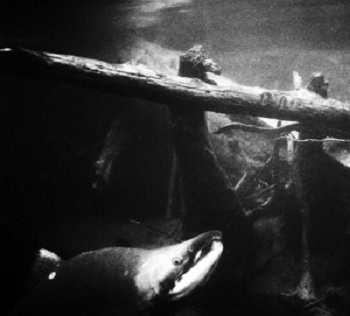
A virus that flourishes in fish farms is now threatening wild populations.
Wild salmon in British Columbia are in trouble. According to one estimate, some populations have dropped by as much as 93 percent since the early 1990s. Lately, the situation has grown dire.,, Last year, the number of sockeye returning to spawn in the Fraser River crashed to a record low. It’s hard to say exactly why this is happening, though logging, climate change, and overfishing all seem to play a role. Among the most controversial potential factors, however, is the virus Piscine orthoreovirus, or PRV. The virus isn’t necessarily fatal, but infected fish may be weakened and unable to swim as fast, making them more likely to be eaten by predators or fail to migrate upriver in order to spawn,,, Not everyone agrees. Among the dissenters is Fisheries and Oceans Canada-DFO,,, >click to read< Killing Sea Lions to Save the Salmon, February 1,1925, Dorothy G. Bell, >click to read< 19:39
Canadian Perspective on Atlantic Cod Stocks & Management
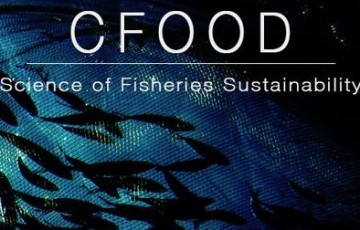 Last week we released a two part feature on the status of Atlantic cod stocks. Click here Part 1 was a general overview of the status of stocks while Part 2 dove deeper into the reasons behind different statuses.
Last week we released a two part feature on the status of Atlantic cod stocks. Click here Part 1 was a general overview of the status of stocks while Part 2 dove deeper into the reasons behind different statuses.
Jeffrey Hutchings, a fishery scientist at Dalhousie University was inspired to comment on our CFOOD feature below;
Despite voluminous research, science discussions of Atlantic cod can verge on the simplistic. Overfishing and ‘the environment’ unhelpfully portrayed as alternative or additive causes of decline. Temperature presented unequivocally as the driver of recruitment. Variable attention to how differential responses to natural and human-induced environmental stressors can be influenced by basic elements of demography — population size, age structure, natural mortality — especially when these fall outside a population’s norm. The collapse of Northern cod was unprecedented but the low temperatures that cod experienced prior to collapse were not (it has been as cold, or colder, if one’s temporal horizon extends beyond the mid 20th Century for this 500-year-old fishery). Recruitment failure is not affecting the recovery of some depleted stocks, such as Southern Gulf of St. Lawrence cod, but altered predator-prey interactions – predicated by prolonged overfishing – almost certainly are. Not all northeast Atlantic cod are doing well, as the current status of those along the Norwegian coast will attest. Read the rest here 14:07
Northern cod threatened by new fisheries rules – A Department of Fisheries and Oceans plan to increase northern cod quotas could devastate the species.
 Governments should be informed by the best available data and evidence. There are societal, environmental, and economic ramifications of not doing so. Despite this, some decision-makers appear to attach little value to scientific advice. Changes to the Fisheries Act in 2012 provide one example. Another was very quietly communicated by the Department of Fisheries and Oceans (DFO) late last week. continued@ the star.com
Governments should be informed by the best available data and evidence. There are societal, environmental, and economic ramifications of not doing so. Despite this, some decision-makers appear to attach little value to scientific advice. Changes to the Fisheries Act in 2012 provide one example. Another was very quietly communicated by the Department of Fisheries and Oceans (DFO) late last week. continued@ the star.com
Two variations so far – “Canada’s cod, and many other depleted fish, unlikely to recover” and “Study offers bleak outlook for fish recovery”
By Margaret Munro, Postmedia News – Canada’s once bountiful cod stocks are not likely to bounce back, according to an international study on the dangers of overfishing. “Here we are more than 20 years after the cod was effectively depleted, and according to our analysis, the recovery of the cod stocks is highly improbable,” says fisheries scientist Jeffrey Hutchings at Dalhousie University, co-author of the study published in the journal Science on Thursday….at the end of the article: “Ecosystems change,” says Hutchings, noting how seals, herring and mackerel now fill some of the gaps left by Canada’s cod collapse. (which part does he not understand?) contined
Aly Thomson, The Canadian Press HALIFAX – The recovery of overexploited fish populations such as cod has been slower than expected and many depleted stocks may never be able to bounce back, a new study says. continued
It would be great if our Canadian friends would leave comments about this. BH
1 comment
Scientists fear Canada will fish bluefin tuna and other species to extinction
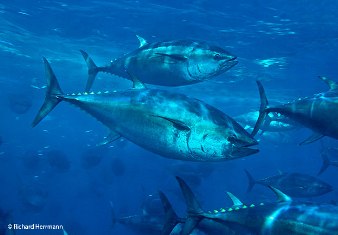 Top marine scientists are denouncing Canada’s management of fish stocks as a commercially driven approach threatening to wipe out species at risk. Read more
Top marine scientists are denouncing Canada’s management of fish stocks as a commercially driven approach threatening to wipe out species at risk. Read more

































